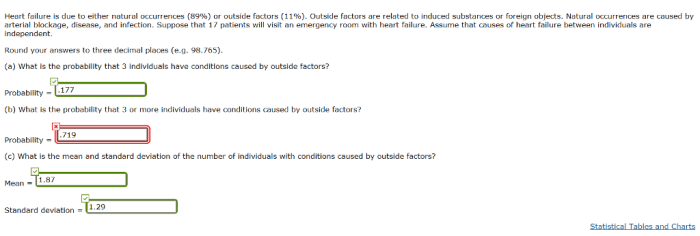Heart failure is due to either natural occurrences, a topic that has garnered significant attention in recent times. This introductory paragraph delves into the topic, providing an overview of the subject matter and highlighting its importance.
The second paragraph delves into the topic, exploring the various natural occurrences that can lead to heart failure, their mechanisms, and potential risk factors.
Causes of Heart Failure

Heart failure is a condition in which the heart is unable to pump enough blood to meet the body’s needs. This can be caused by a variety of factors, including natural occurrences such as:
Ischemic Heart Disease
- Occurs when the blood supply to the heart is blocked, usually due to atherosclerosis (plaque buildup in the arteries).
- Can lead to a heart attack, which can damage the heart muscle and lead to heart failure.
Cardiomyopathy
- A disease of the heart muscle that can weaken it and make it unable to pump blood effectively.
- Can be caused by a variety of factors, including genetic disorders, infections, and toxins.
Valvular Heart Disease
- A condition in which the heart valves do not function properly, which can lead to blood leaking back into the heart.
- Can be caused by a variety of factors, including congenital defects, infections, and rheumatic fever.
Arrhythmias
- Abnormal heart rhythms that can interfere with the heart’s ability to pump blood effectively.
- Can be caused by a variety of factors, including genetic disorders, electrolyte imbalances, and certain medications.
Hypertension
- High blood pressure that can damage the heart muscle and lead to heart failure.
- Can be caused by a variety of factors, including obesity, smoking, and a high-sodium diet.
Risk Factors for Heart Failure: Heart Failure Is Due To Either Natural Occurrences
There are a number of risk factors that can increase the likelihood of developing heart failure, including:
Age, Heart failure is due to either natural occurrences
- The risk of heart failure increases with age.
- This is because the heart muscle weakens with age, and the arteries become more narrow and less flexible.
Sex
- Men are more likely to develop heart failure than women.
- This is because men are more likely to have risk factors for heart failure, such as high blood pressure and high cholesterol.
Race
- African Americans are more likely to develop heart failure than whites.
- This is because African Americans are more likely to have risk factors for heart failure, such as high blood pressure, diabetes, and obesity.
Family history
- People with a family history of heart failure are more likely to develop the condition.
- This is because heart failure can be caused by genetic disorders.
Lifestyle factors
- Certain lifestyle factors can increase the risk of heart failure, such as:
- Smoking
- Obesity
- Lack of physical activity
- Unhealthy diet
Pathophysiology of Heart Failure
Heart failure occurs when the heart is unable to pump enough blood to meet the body’s needs. This can lead to a number of symptoms, including shortness of breath, fatigue, and swelling in the legs and ankles.
The pathophysiology of heart failure is complex, but it can be summarized as follows:
- The heart muscle is damaged or weakened, which reduces its ability to pump blood.
- The heart chambers enlarge in an attempt to compensate for the reduced pumping ability.
- The enlarged heart chambers are less efficient at pumping blood, which leads to a decrease in cardiac output.
- The decreased cardiac output leads to a buildup of fluid in the body, which can cause shortness of breath, fatigue, and swelling in the legs and ankles.
Diagnosis of Heart Failure

Heart failure is diagnosed based on a combination of symptoms, physical examination findings, and diagnostic tests.
Symptoms of heart failure can include:
- Shortness of breath
- Fatigue
- Swelling in the legs and ankles
- Chest pain
- Lightheadedness or dizziness
- Rapid or irregular heartbeat
Physical examination findings of heart failure can include:
- Enlarged heart
- Murmurs
- Rales (crackling sounds in the lungs)
- Edema (swelling) in the legs and ankles
Diagnostic tests for heart failure can include:
- Electrocardiogram (ECG)
- Echocardiogram
- Chest X-ray
- Blood tests
Management of Heart Failure

The management of heart failure involves a combination of medications, lifestyle modifications, and, in some cases, surgery.
Medications for heart failure can include:
- ACE inhibitors
- Angiotensin receptor blockers (ARBs)
- Beta-blockers
- Diuretics
- Digoxin
Lifestyle modifications for heart failure can include:
- Losing weight
- Eating a healthy diet
- Getting regular exercise
- Quitting smoking
- Reducing stress
Surgery for heart failure may be necessary in some cases, such as when the heart valves are damaged or when the heart is too weak to pump blood effectively.
Prognosis of Heart Failure

The prognosis of heart failure depends on a number of factors, including the underlying cause, the severity of the symptoms, and the response to treatment.
The 5-year survival rate for people with heart failure is about 50%.
People with heart failure are at risk for a number of complications, including:
- Heart attack
- Stroke
- Kidney failure
- Liver failure
- Death
User Queries
What are the most common natural occurrences that can lead to heart failure?
Coronary artery disease, hypertension, and diabetes are among the most prevalent natural occurrences associated with heart failure.
How can lifestyle modifications help mitigate the risk of heart failure?
Maintaining a healthy weight, engaging in regular physical activity, and adhering to a balanced diet can significantly reduce the risk of developing heart failure.